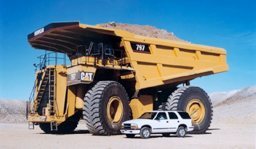HP Confirms: PCs are Like Trucks
August 22, 2011
At the All Things Digital conference in 2008, Steve Jobs was quoted in an interview with Walt Mossberg, likening PCs to trucks:
“When we were an agrarian nation, all cars were trucks, because that’s what you needed on the farm. But as vehicles started to be used in the urban centers, cars got more popular. Innovations like automatic transmission and power steering and things that you didn’t care about in a truck as much started to become paramount in cars. … PCs are going to be like trucks. They’re still going to be around, they’re still going to have a lot of value, but they’re going to be used by one out of X people. … I think that we’re [sic] embarked on that.”
With the introduction of the iPad, I predicted the demise of the PC as we know it. My prediction was simple: over the next two to three years, the only people who will be using PCs as we know them are professionals who create content, manage systems or otherwise need serious computing power to do their jobs.
HP is the biggest PC manufacturer on the planet. They’re the market leader. So why on Earth did they just decide to exit the PC business and focus on the enterprise, printing, networking and services? Because their operating margins on PCs under $1000 are less than 6% - sometimes lower. Any PC maker competing in this space needs to sell on volume and volume alone. The flip side of the coin here is that Apple’s market share of PCs over $1000 is hovering around 90%. Compare HP’s operating margin of ~6% to Apple’s ~28% and it’s not hard to understand why HP is jettisoning what will quickly become a money LOSING operation.
The question is how did this happen? In a word: iPad. Since the iPad debuted last year, Apple has sold 30 million units and counting. Even now, they can’t build them fast enough to meet demand. The reality is that the vast majority of those 30 million people, laying out between $500 and $750 on an iPad, also didn’t buy a cheap PC. The end result is that sales of low-end PCs are collapsing. HP has made a decision to get out before the point of no return. Considering what’s happening, Dell and Lenovo (neither of which have viable iPad competitors) are in the same boat. Consumers are buying iPads in droves and this pattern is going to have a direct impact on the cost of IT in business.
Within three years (probably less), businesses won’t be able to buy cheap PCs. Consumer purchasing trends dictate what options businesses have for deploying technology to their employees. What will it mean to a business when the only ‘PC’ they can buy costs $2000? $3000?
Apple continues to push the envelope of what a tablet is, and what it can do. At this point, tablets are not an adequate replacement for content creators. For everyone else though, iPad is bringing appliance computing to regular people. Low hardware costs, low training costs, low support costs, and low software costs (the App Store is the bane of high-priced suite software, but that’s another story). Over time, iPads will be able to do more, talk to big displays and perhaps offer a desktop-class work environment.
The big question is how long will it take before iPads completely replace high-cost PCs in the workplace, like the ones used by professionals and content creators?
The cheap PC is going away and HP’s about-face confirms that. For you Mac users out there, I’ll close with a question: what will happen when the average selling price of a PC matches the average selling price of a Mac?
I don’t think we’ll have to wait very long to find out.
Other posts by Chris Marriott
- Seeking Backstage Resellers
- Preemptive Multi-Talking -- Johnny and the Liquidators
- Preemptive Multi-Talking -- Pundits are the worst!
- Preemptive Multi-Talking -- WWDC 2016
- Preemptive Multi-Talking -- Of Cash Piles and Job Cuts
- Preemptive Multi-Talking -- 60 Scary Minutes Edition
- Preemptive Multi-Talking -- [R]Evolution Edition
- Preemptive Multi-Talking -- Pinocchio Edition
- Preemptive Multi-Talking -- FBI vs. Apple
- Preemptive Multi-Talking -- 1984 Edition
- Preemptive Multi-Talking -- Earnings Madness Edition
- Preemptive Multi-Talking -- All your passwords are belong to us.
- Preemptive Multi-Talking -- Fog, Fizzle, Flop Edition
- Preemptive Multi-Talking -- FUD Redux Edition
- Preemptive Multi-Talking -- Privacy be Damned Edition
